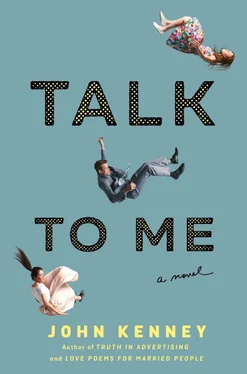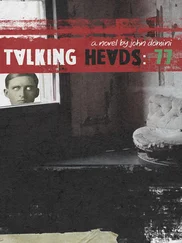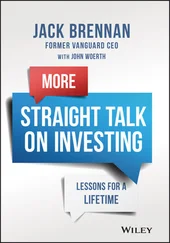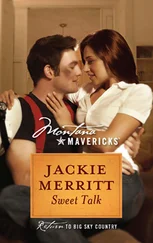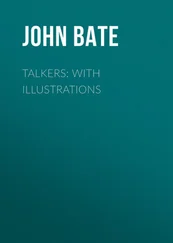He had covered everything. Moon landings and coups and assassinations and hijackings and armistices. Live. On the scene. No makeup or graphics or theme music. Just raw footage and skilled writing. Nothing but Hal and his chain-smoking producer, Leonard “Boots” Feeney, and a network that believed news mattered. Until it didn’t believe it. Until the networks were taken over by corporations intent on packaging the news, profiting off the news, entertaining instead of informing, when they became obsessed with the three words that would be the ruin of civilization, according to Hal. Marketing. Advertising. Branding.
“No, he shouldn’t,” Hal said. “I have to be honest with you and tell you I think it’s a disgrace. I don’t know what’s going on over there but I’m sure Mr. Grayson will apologize.”
“Have you been in touch with Ted Grayson since this video came out?”
“I haven’t. I’m retired and they don’t really reach out to me anymore.”
“If they did what would you say?”
“I’d say grow up. I’d say a real man never talks like this. I’d say beg this young woman’s forgiveness and the forgiveness of your audience, especially the female viewers.”
“Hal Winship. You’re a legend and we thank you for being here this morning. Coming up, Al Roker introduces us to a hundred-and-two-year-old pogo stick champion. This is Today on NBC.”
• • •
And Ted?
He had seen the video Wednesday evening, when he’d returned home for the emergency call. He had watched it, again and again, holding his hands against his forehead, as if trying to keep his brain from falling out. It was like he was watching someone else. He didn’t remember it. He couldn’t have said it. His voice, his face. It wasn’t him, he wanted to say. If he could just explain. He had a bad night.
• • •
Within an hour there was a video trending on YouTube of Ted screaming at the girl, and Hal saying “It’s a disgrace,” all to a techno-funk beat.
• • •
You could watch the counter on YouTube by hitting refresh every few seconds. Forty-eight hours in and it was at more than two million views. By week’s end it would be five million. The comments were unrelenting and savage. Some were sarcastic. Some were funny. Some suggested he should kill himself. By Wednesday the comments section would be disabled by YouTube customer service, in large part because a repeat commenter was threatening to kill Ted. The troll gave Ted’s Bedford address. The Bedford Police Department put a patrol car in front of Ted’s house.
Newspapers, the weekend newscasts, TMZ: all had stories. Someone from TMZ had gotten Ted’s cell phone number and called, asked for an interview. He’d hung up.
It would go away, he told himself.
• • •
Simon Samson waited for Tamara to speak. But all she did was stare out the window.
For almost seven minutes he’d made his case on Ted’s behalf. He’d brought numbers from the marketing department showing Ted’s value to the network. He’d had Roy someone-or-other, the head of advertising, call around to some of the largest advertisers of the broadcast, among them Pfizer (Viagra), Eli Lilly (Cialis), Procter & Gamble (adult diapers division), and Johnson & Johnson (Imodium) to get them to write letters on Ted’s behalf, about how they wouldn’t pull sponsorship. The general reaction to this request being “Have you lost your fucking mind, Roy?”
Simon Samson was head of the news division and had been for almost twenty years. He’d been brought in at the end of Hal Winship’s tenure and watched—after Hal’s retirement—as the once-preeminent network news broadcast in America slowly went down the toilet with Hal’s handpicked successor, George Beebe. George was a fine reporter but Hal had, in a rare judgment misstep, relied too much on the old-boy network, on a friendship, to put George in the anchor seat after Hal’s remarkable twenty-eight-year reign.
Six months in, ratings plummeted. Simon was brought in to revamp the news division. He and Ted had worked together in Boston. He convinced the network to let George go and put Ted in. Young, handsome. They focus-group tested Ted and he did surprisingly well.
Simon had urged Tamara that the sound move was to run a carefully scripted and produced apology show. Not merely an apology at the end of the broadcast, but a program about Ted, where you saw him with Claire and Franny, where he apologized on camera to Natalia. Simon had not run this idea by Ted yet but, considering the alternatives, was confident he’d agree to it.
Simon had ended his talk (he’d been up late the evening before and had risen early this morning, scribbling notes, speaking aloud as he shaved) with something he believed in his soul. That Ted Grayson was the last of the great American newsmen, that he mattered to the eight million men and women who tuned in each evening, that he was a valuable part of their day. And if Simon could speak on a personal note, he believed Ted was a good man who messed up and simply needed forgiveness. We’re a forgiving people, Tamara, Simon had said. If this had happened twenty years ago, the event would have been laughed about over drinks that evening, the poor intern or whoever was subject to a powerful white man’s temper or ass grab, inappropriate comment or random erection, would be given a gift certificate to Keens Steakhouse and an autographed eight-by-ten glossy of Ted. Here, Simon smiled and tried to chuckle but it sounded as if he were choking.
Done, and rather satisfied with his speech, Simon sat back and waited. He was a man used to getting what he wanted.
Tamara had listened, looking at Simon from time to time but mostly looking out the window of her office, high above Midtown Manhattan.
“Do you know when I stopped listening to you, Simon?”
She turned and looked at him now.
“It was around the time when you were telling me what a great newsman Ted Grayson is. Do you know what I started thinking about instead? I was thinking about how you guys don’t know the end of the movie. Now, I could tell you the end but I also don’t want to ruin it for you. You have no idea what’s outside waiting for you. I can’t believe I’m sitting here listening to a middle-aged white man tell me that I should forgive another middle-aged white man who makes eleven million dollars a year and called a poor immigrant a Russian whore. You’ll have to forgive me, but as a forty-four-year-old woman who for most of twenty years of her working life has endured comments about my tits, ass, face, and gender from people exactly like Ted, I think I’ll give empathy and forgiveness a pass. I’ve personally used up all my forgiveness chits to men behaving badly.”
Simon said nothing, though his mouth did open a bit involuntarily.
“Your expression suggests that wasn’t the answer you were hoping for,” Tamara said.
“Christ. A little harsh, aren’t we?” Simon finally managed.
“Are we?” she snapped back. “If I had my way I’d cut him loose now, publicly, ugly. I’d distance myself so far from that kind of behavior that it would make your head spin. I’d have his seat filled and wave goodbye to his impotent, incontinent viewers and take the hit for a few months until they got used to the new male anchor’s young handsome face or the new female anchor’s remarkable legs, which we would showcase in most every shot, so that in six months’ time people would say, ‘Ted who? I think he died.’”
And for a moment Simon thought it was over.
“But unfortunately, despite my title, job description, and unusually large salary, I have a vagina, which in this board’s view means I’m incapable of making a major decision. The board wants him to stay, by the slimmest of margins, I might add. They want the apology. And it better be fucking good.”
Читать дальше
